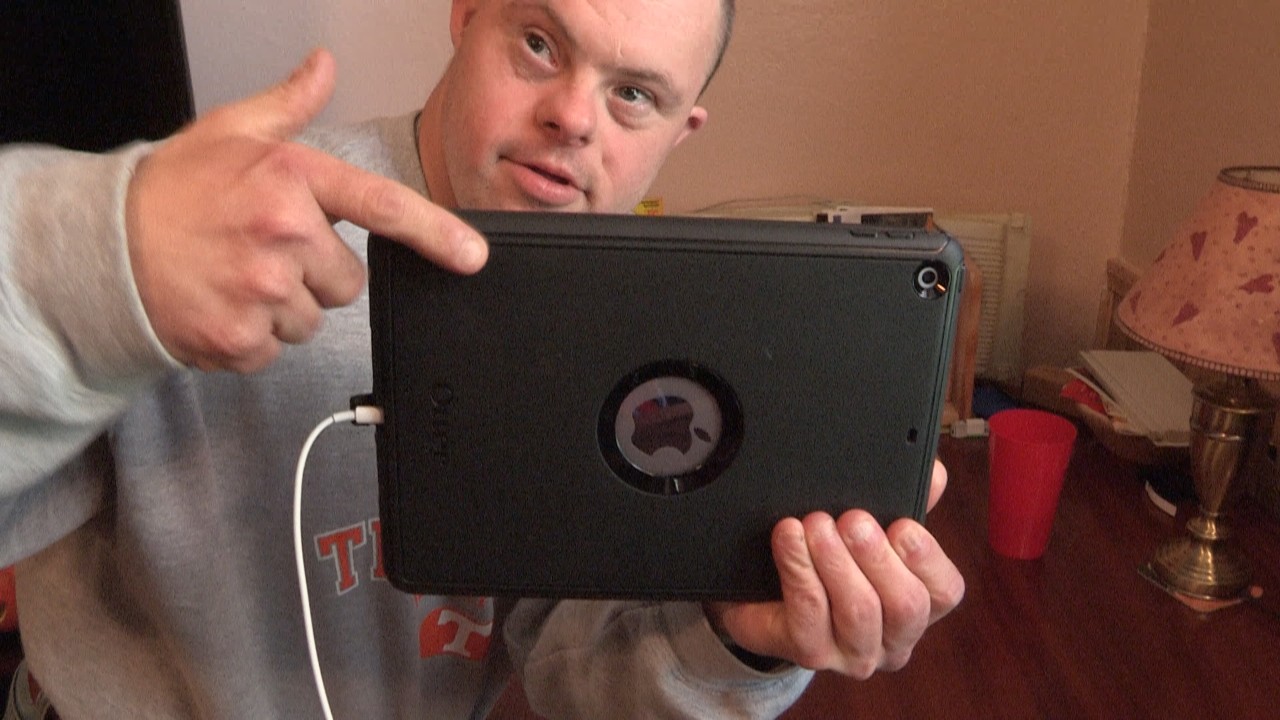Breaking Ground 96 - A Life-Changer: Using Enabling Technology to promote independence
by Krystyne Brown, Public Information Officer, TN Department of Intellectual and Developmental Disabilities
On a sunny October morning, Brad Presnell gets up from a small, shaded bench on his front porch, opens his glass door and walks into his new home on a quiet street near downtown Kingsport, Tennessee. He finds a comfortable spot on the couch next to his TV and sits back down to relax on his day off from his job at a local Ingles grocery store. He keeps his phone close in case his parents call from their home just minutes away. It’s a life of independence with a place to call his own and it’s the life Brad knew he always wanted.
In May 2018, Core Services of Northeast Tennessee successfully moved another person they support into a home of his own with technology supports through the Department of Intellectual and Developmental Disabilities’ (DIDD) Enabling Technology test program. After seeing how successful it was, they met with Brad and his parents to begin making person-centered plans and decide how technology could also help him meet his goals for his future.
“The ultimate goal is to live as independently as possible and I think this is a huge, huge step for the state of Tennessee and a huge step for anybody that is involved,” said Raymond “Geeter” Lowe, Brad’s Direct Support Staff of six years. “You very seldom [see] life-changers in your life, especially in your job. But this is a life-changer for everybody.”
Together Brad, Core Services, a DIDD Case Manager and his circle of support found a duplex that fit his needs and identified technology that would blend seamlessly into his new home and increase his self-reliance. Video doorbells were installed to screen visitors and sensors were placed on his stove for cooking safety. He was given a medication administration button, a panic pendant to press for emergencies, and an iPad to assist him to communicate and video chat with Geeter or family remotely when he needs them.
Brad’s parents, Tom and Paulette Presnell, were apprehensive at first, but the outcome was one they dreamed of while they were raising him on their farm in East Tennessee. After months of settling in to his home, his parents feel more confident about the technology, his safety, and his ability to navigate his community on his own.
“It’s just unbelievable. Brad’s an only child and we’ve always known in the back of our minds that we won’t always be here and we want to set him up as good as we can,” Paulette added. “This just has been a dream come true. It truly has.”
As DIDD has expanded the use of Enabling Technology, the partnership and buy-in from families is an important factor. As in Brad’s case, family members have been key advocates for the use of technology to promote independence for their loved ones, and it offers them peace of mind knowing help is not far away should an emergency arise.
The technology has taken some time to get used to, but now Brad isn’t afraid to ask visitors for some time alone in his home to enjoy his space. When asked if he loves his new house or independence, he nods and says, “Yes.”
DIDD is now receiving recurring state dollars to continue making Enabling Technology available to transform the lives of Tennesseans with disabilities and assist them in living the lives they choose.
The Enabling Technology Initiative, Year 2
by Cara Kumari, Communications Director, TN Department of Intellectual and Developmental Disabilities.
The Department of Intellectual and Developmental Disabilities (DIDD) is currently in year two of its Enabling Technology Initiative. “Enabling technology” refers to any number of ways that technology devices or strategies can be used to support someone’s independence and goals, in a way that is totally drive by the needs and desires of that individual. After a successful pilot year where Enabling Technology supported several persons who receive DIDD Medicaid waiver services to live more independently, Governor Haslam and the General Assembly provided $500,000 in recurring funds to expand the program.
The highlight of this year’s initiative is Agency Transformation. Three DIDD provider agencies - Core Services of Northeast Tennessee, Prospect, and New Horizons - have been selected to become the state’s first Technology Now agencies. This innovative approach to education, training, exposure and implementation of Enabling Technology, combined with a commitment to person-centered practices and Employment First, will serve as a model of best practice for fostering independence and improving the quality of life for persons supported. Through this initiative, these agencies are receiving assistance from subject matter experts from SimplyHome and AbleLink Smart Living Technologies to develop transformation plans and create a sustainable approach to utilizing Enabling Technology.
The goal is to create culture change within the agencies so that Enabling Technology is a foundational component of supports provided to people. In addition, these agencies have also committed to serving as mentors to other provider agencies as more and more people look to technology as a means of supporting people to live more independently.
In addition to the Technology Now Agency Transformation Initiative, St. John’s Community Services is expanding their Enabling Technology program, and both SRVS (Shelby Residential and Vocational Services) and Emory Valley Center have been selected to receive start-up funding to implement Enabling Technology for the people they support.